TLAW 401 - Australian Business Law: Contract Law Assignment Report
VerifiedAdded on 2022/10/18
|10
|2169
|11
Report
AI Summary
This report analyzes a contract law case involving Penny and Mrs. Havealot, focusing on the absence of a signed lease deed and the applicability of contract law principles. The report examines the material facts, issues, and relevant rules of contract formation, including offer, acceptance, capacity, consideration, and intention to create a legal relationship. It discusses the concept of promissory estoppel, referencing the case of Waltons Stores (Interstate) Ltd v Maher. The application section applies these legal principles to the facts of the case, arguing that a valid agreement existed and that Penny can enforce the contract based on promissory estoppel. The conclusion affirms Penny's right to enforce the contract, even without a signed lease, due to Mrs. Havealot's actions and the principles of contract law. The report includes a bibliography of books, journals, and case laws, supporting the analysis. This assignment, completed for the TLAW 401 Business Law course, provides a comprehensive analysis of contract law principles within the Australian legal framework.

Australian Busisness Law
[Type the document
subtitle]
[Type the document
subtitle]
Paraphrase This Document
Need a fresh take? Get an instant paraphrase of this document with our AI Paraphraser

Masters of Law 1
Contents
Material facts..............................................................................................................................................2
Issue............................................................................................................................................................2
Rules............................................................................................................................................................2
Contents
Material facts..............................................................................................................................................2
Issue............................................................................................................................................................2
Rules............................................................................................................................................................2
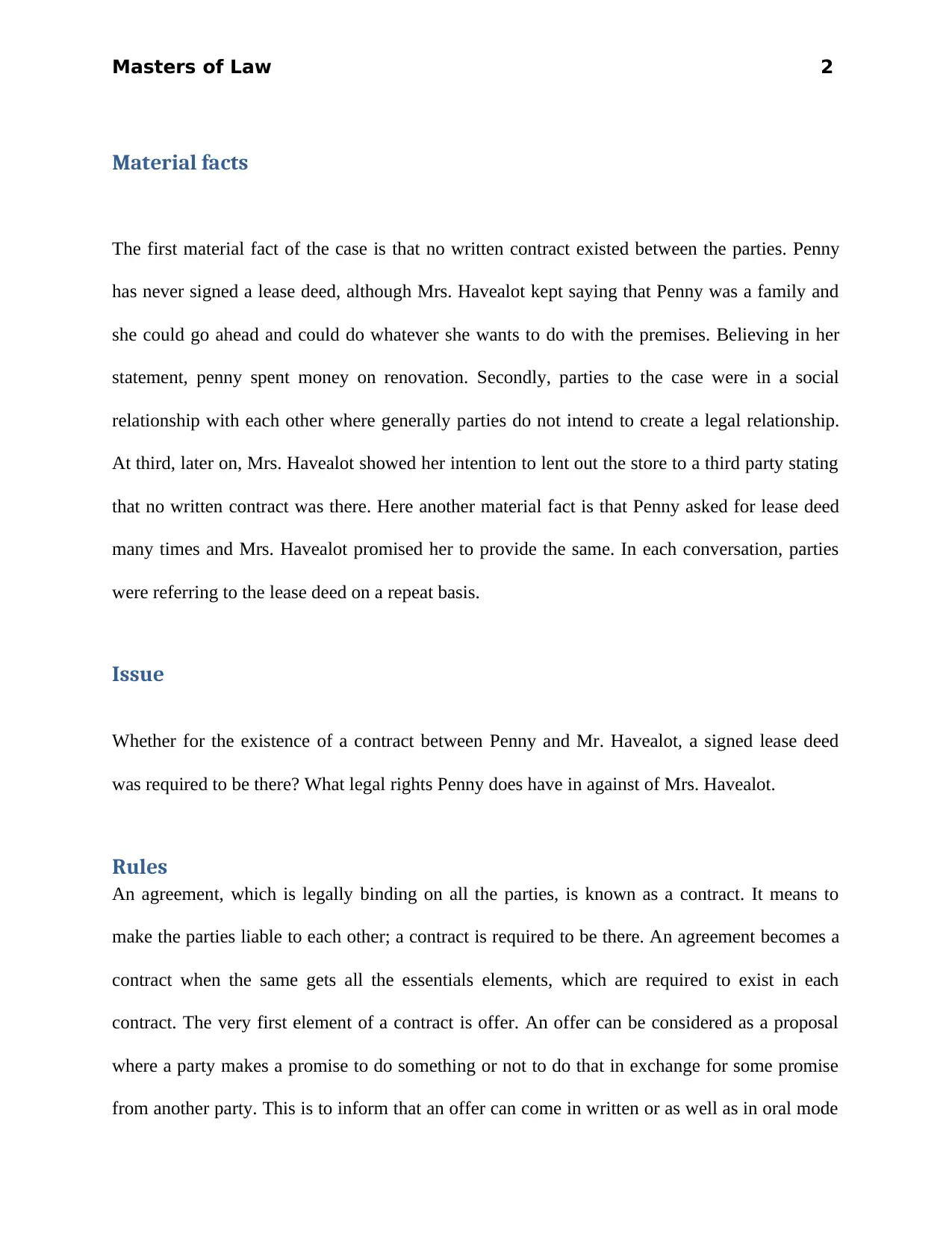
Masters of Law 2
Material facts
The first material fact of the case is that no written contract existed between the parties. Penny
has never signed a lease deed, although Mrs. Havealot kept saying that Penny was a family and
she could go ahead and could do whatever she wants to do with the premises. Believing in her
statement, penny spent money on renovation. Secondly, parties to the case were in a social
relationship with each other where generally parties do not intend to create a legal relationship.
At third, later on, Mrs. Havealot showed her intention to lent out the store to a third party stating
that no written contract was there. Here another material fact is that Penny asked for lease deed
many times and Mrs. Havealot promised her to provide the same. In each conversation, parties
were referring to the lease deed on a repeat basis.
Issue
Whether for the existence of a contract between Penny and Mr. Havealot, a signed lease deed
was required to be there? What legal rights Penny does have in against of Mrs. Havealot.
Rules
An agreement, which is legally binding on all the parties, is known as a contract. It means to
make the parties liable to each other; a contract is required to be there. An agreement becomes a
contract when the same gets all the essentials elements, which are required to exist in each
contract. The very first element of a contract is offer. An offer can be considered as a proposal
where a party makes a promise to do something or not to do that in exchange for some promise
from another party. This is to inform that an offer can come in written or as well as in oral mode
Material facts
The first material fact of the case is that no written contract existed between the parties. Penny
has never signed a lease deed, although Mrs. Havealot kept saying that Penny was a family and
she could go ahead and could do whatever she wants to do with the premises. Believing in her
statement, penny spent money on renovation. Secondly, parties to the case were in a social
relationship with each other where generally parties do not intend to create a legal relationship.
At third, later on, Mrs. Havealot showed her intention to lent out the store to a third party stating
that no written contract was there. Here another material fact is that Penny asked for lease deed
many times and Mrs. Havealot promised her to provide the same. In each conversation, parties
were referring to the lease deed on a repeat basis.
Issue
Whether for the existence of a contract between Penny and Mr. Havealot, a signed lease deed
was required to be there? What legal rights Penny does have in against of Mrs. Havealot.
Rules
An agreement, which is legally binding on all the parties, is known as a contract. It means to
make the parties liable to each other; a contract is required to be there. An agreement becomes a
contract when the same gets all the essentials elements, which are required to exist in each
contract. The very first element of a contract is offer. An offer can be considered as a proposal
where a party makes a promise to do something or not to do that in exchange for some promise
from another party. This is to inform that an offer can come in written or as well as in oral mode
⊘ This is a preview!⊘
Do you want full access?
Subscribe today to unlock all pages.

Trusted by 1+ million students worldwide
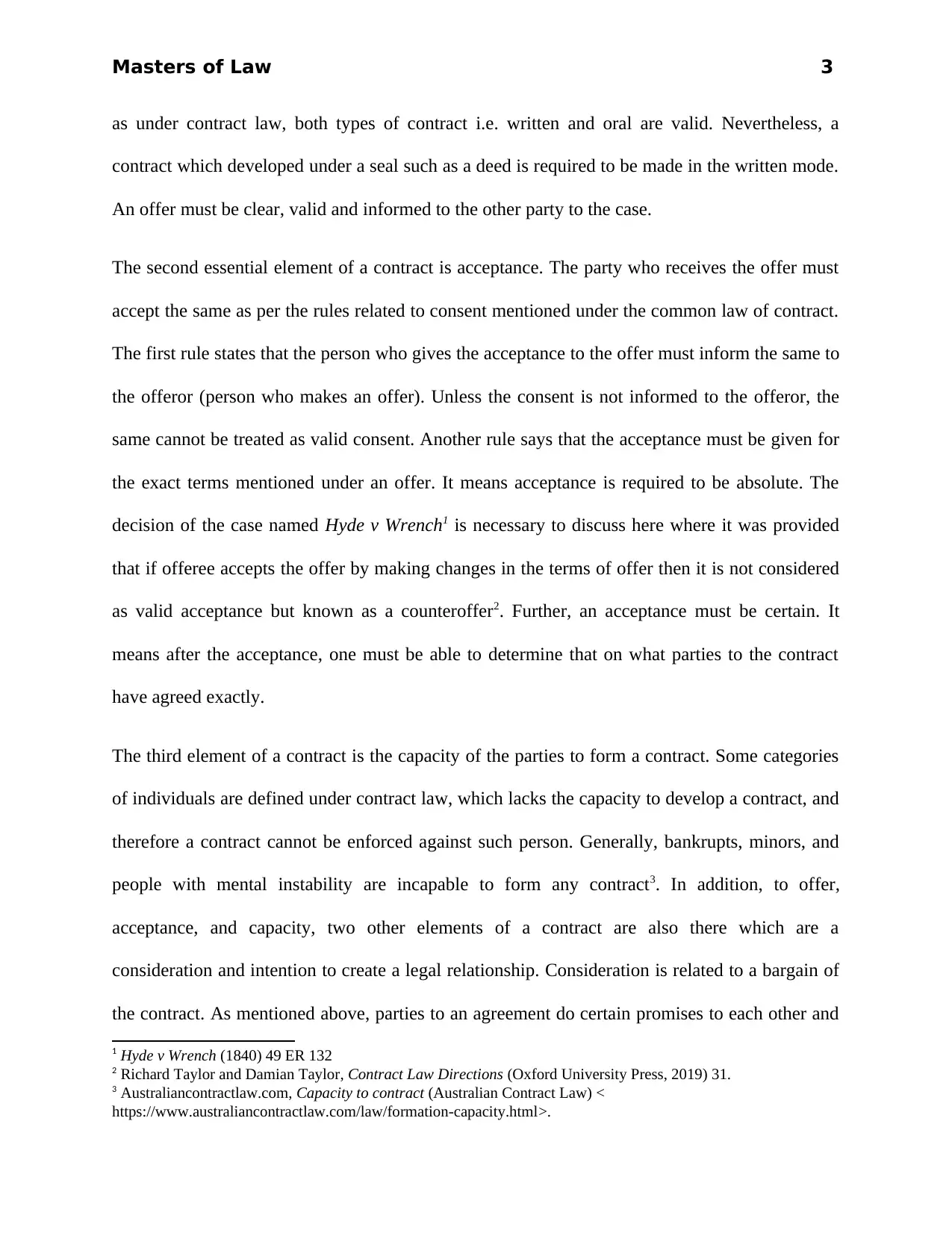
Masters of Law 3
as under contract law, both types of contract i.e. written and oral are valid. Nevertheless, a
contract which developed under a seal such as a deed is required to be made in the written mode.
An offer must be clear, valid and informed to the other party to the case.
The second essential element of a contract is acceptance. The party who receives the offer must
accept the same as per the rules related to consent mentioned under the common law of contract.
The first rule states that the person who gives the acceptance to the offer must inform the same to
the offeror (person who makes an offer). Unless the consent is not informed to the offeror, the
same cannot be treated as valid consent. Another rule says that the acceptance must be given for
the exact terms mentioned under an offer. It means acceptance is required to be absolute. The
decision of the case named Hyde v Wrench1 is necessary to discuss here where it was provided
that if offeree accepts the offer by making changes in the terms of offer then it is not considered
as valid acceptance but known as a counteroffer2. Further, an acceptance must be certain. It
means after the acceptance, one must be able to determine that on what parties to the contract
have agreed exactly.
The third element of a contract is the capacity of the parties to form a contract. Some categories
of individuals are defined under contract law, which lacks the capacity to develop a contract, and
therefore a contract cannot be enforced against such person. Generally, bankrupts, minors, and
people with mental instability are incapable to form any contract3. In addition, to offer,
acceptance, and capacity, two other elements of a contract are also there which are a
consideration and intention to create a legal relationship. Consideration is related to a bargain of
the contract. As mentioned above, parties to an agreement do certain promises to each other and
1 Hyde v Wrench (1840) 49 ER 132
2 Richard Taylor and Damian Taylor, Contract Law Directions (Oxford University Press, 2019) 31.
3 Australiancontractlaw.com, Capacity to contract (Australian Contract Law) <
https://www.australiancontractlaw.com/law/formation-capacity.html>.
as under contract law, both types of contract i.e. written and oral are valid. Nevertheless, a
contract which developed under a seal such as a deed is required to be made in the written mode.
An offer must be clear, valid and informed to the other party to the case.
The second essential element of a contract is acceptance. The party who receives the offer must
accept the same as per the rules related to consent mentioned under the common law of contract.
The first rule states that the person who gives the acceptance to the offer must inform the same to
the offeror (person who makes an offer). Unless the consent is not informed to the offeror, the
same cannot be treated as valid consent. Another rule says that the acceptance must be given for
the exact terms mentioned under an offer. It means acceptance is required to be absolute. The
decision of the case named Hyde v Wrench1 is necessary to discuss here where it was provided
that if offeree accepts the offer by making changes in the terms of offer then it is not considered
as valid acceptance but known as a counteroffer2. Further, an acceptance must be certain. It
means after the acceptance, one must be able to determine that on what parties to the contract
have agreed exactly.
The third element of a contract is the capacity of the parties to form a contract. Some categories
of individuals are defined under contract law, which lacks the capacity to develop a contract, and
therefore a contract cannot be enforced against such person. Generally, bankrupts, minors, and
people with mental instability are incapable to form any contract3. In addition, to offer,
acceptance, and capacity, two other elements of a contract are also there which are a
consideration and intention to create a legal relationship. Consideration is related to a bargain of
the contract. As mentioned above, parties to an agreement do certain promises to each other and
1 Hyde v Wrench (1840) 49 ER 132
2 Richard Taylor and Damian Taylor, Contract Law Directions (Oxford University Press, 2019) 31.
3 Australiancontractlaw.com, Capacity to contract (Australian Contract Law) <
https://www.australiancontractlaw.com/law/formation-capacity.html>.
Paraphrase This Document
Need a fresh take? Get an instant paraphrase of this document with our AI Paraphraser
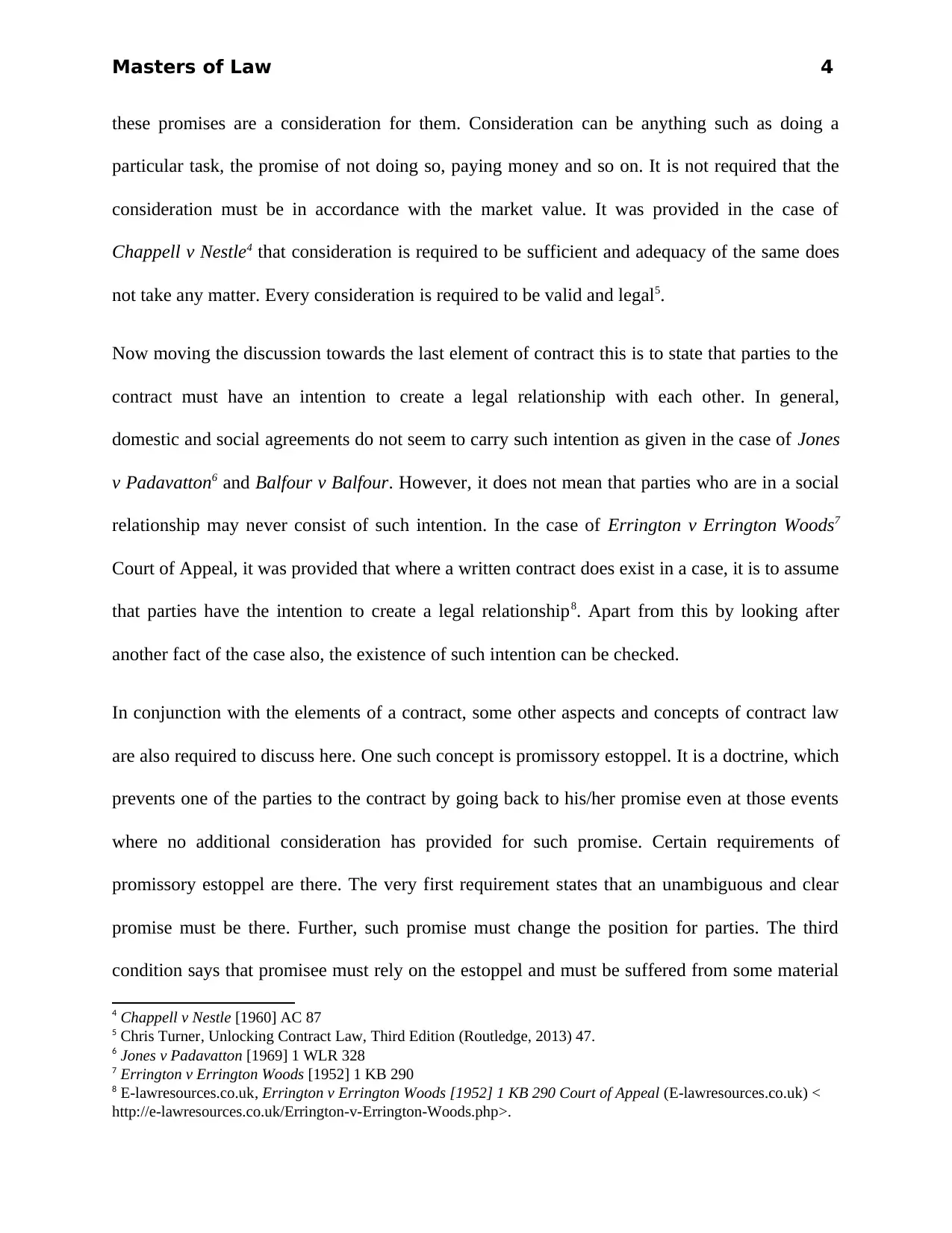
Masters of Law 4
these promises are a consideration for them. Consideration can be anything such as doing a
particular task, the promise of not doing so, paying money and so on. It is not required that the
consideration must be in accordance with the market value. It was provided in the case of
Chappell v Nestle4 that consideration is required to be sufficient and adequacy of the same does
not take any matter. Every consideration is required to be valid and legal5.
Now moving the discussion towards the last element of contract this is to state that parties to the
contract must have an intention to create a legal relationship with each other. In general,
domestic and social agreements do not seem to carry such intention as given in the case of Jones
v Padavatton6 and Balfour v Balfour. However, it does not mean that parties who are in a social
relationship may never consist of such intention. In the case of Errington v Errington Woods7
Court of Appeal, it was provided that where a written contract does exist in a case, it is to assume
that parties have the intention to create a legal relationship8. Apart from this by looking after
another fact of the case also, the existence of such intention can be checked.
In conjunction with the elements of a contract, some other aspects and concepts of contract law
are also required to discuss here. One such concept is promissory estoppel. It is a doctrine, which
prevents one of the parties to the contract by going back to his/her promise even at those events
where no additional consideration has provided for such promise. Certain requirements of
promissory estoppel are there. The very first requirement states that an unambiguous and clear
promise must be there. Further, such promise must change the position for parties. The third
condition says that promisee must rely on the estoppel and must be suffered from some material
4 Chappell v Nestle [1960] AC 87
5 Chris Turner, Unlocking Contract Law, Third Edition (Routledge, 2013) 47.
6 Jones v Padavatton [1969] 1 WLR 328
7 Errington v Errington Woods [1952] 1 KB 290
8 E-lawresources.co.uk, Errington v Errington Woods [1952] 1 KB 290 Court of Appeal (E-lawresources.co.uk) <
http://e-lawresources.co.uk/Errington-v-Errington-Woods.php>.
these promises are a consideration for them. Consideration can be anything such as doing a
particular task, the promise of not doing so, paying money and so on. It is not required that the
consideration must be in accordance with the market value. It was provided in the case of
Chappell v Nestle4 that consideration is required to be sufficient and adequacy of the same does
not take any matter. Every consideration is required to be valid and legal5.
Now moving the discussion towards the last element of contract this is to state that parties to the
contract must have an intention to create a legal relationship with each other. In general,
domestic and social agreements do not seem to carry such intention as given in the case of Jones
v Padavatton6 and Balfour v Balfour. However, it does not mean that parties who are in a social
relationship may never consist of such intention. In the case of Errington v Errington Woods7
Court of Appeal, it was provided that where a written contract does exist in a case, it is to assume
that parties have the intention to create a legal relationship8. Apart from this by looking after
another fact of the case also, the existence of such intention can be checked.
In conjunction with the elements of a contract, some other aspects and concepts of contract law
are also required to discuss here. One such concept is promissory estoppel. It is a doctrine, which
prevents one of the parties to the contract by going back to his/her promise even at those events
where no additional consideration has provided for such promise. Certain requirements of
promissory estoppel are there. The very first requirement states that an unambiguous and clear
promise must be there. Further, such promise must change the position for parties. The third
condition says that promisee must rely on the estoppel and must be suffered from some material
4 Chappell v Nestle [1960] AC 87
5 Chris Turner, Unlocking Contract Law, Third Edition (Routledge, 2013) 47.
6 Jones v Padavatton [1969] 1 WLR 328
7 Errington v Errington Woods [1952] 1 KB 290
8 E-lawresources.co.uk, Errington v Errington Woods [1952] 1 KB 290 Court of Appeal (E-lawresources.co.uk) <
http://e-lawresources.co.uk/Errington-v-Errington-Woods.php>.
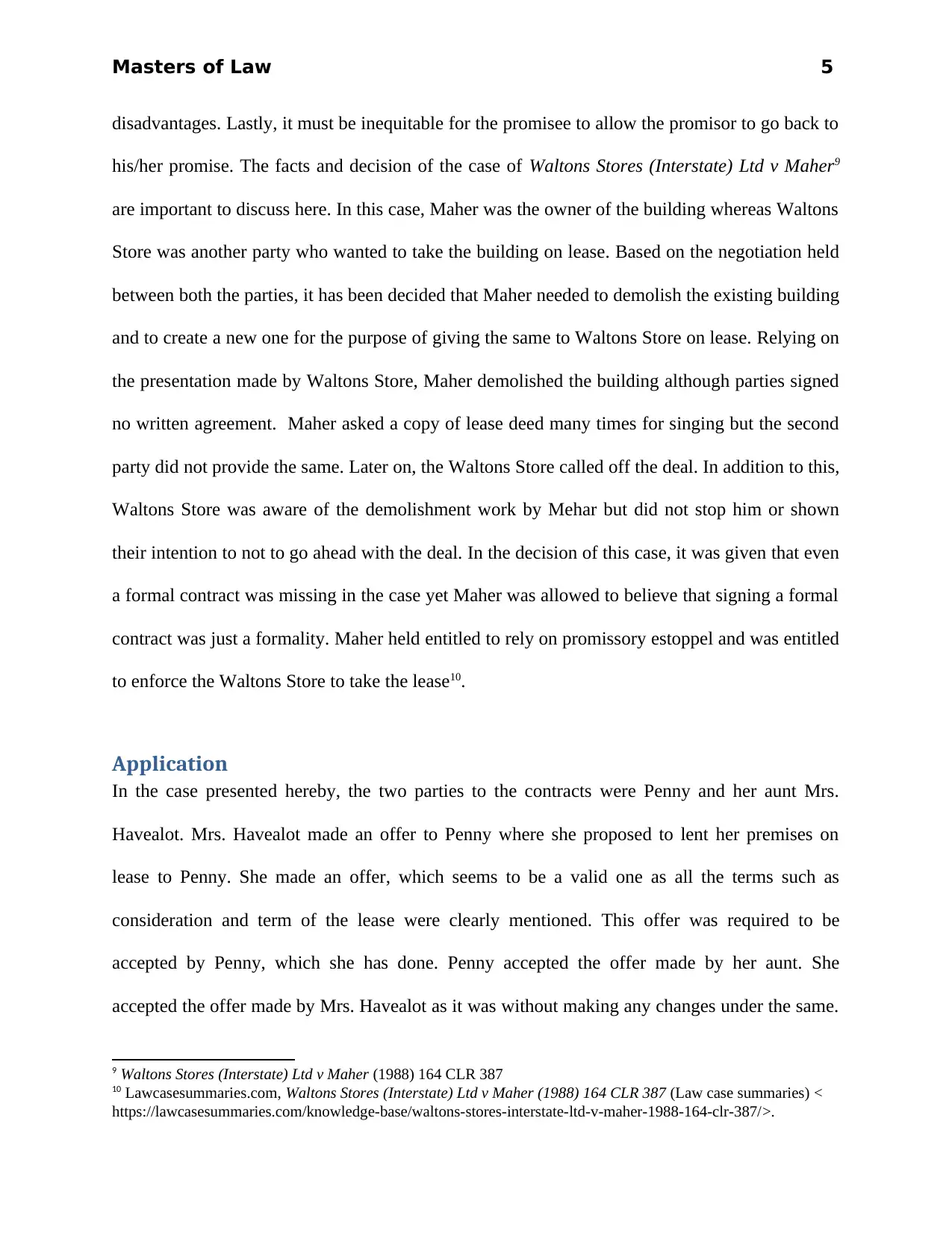
Masters of Law 5
disadvantages. Lastly, it must be inequitable for the promisee to allow the promisor to go back to
his/her promise. The facts and decision of the case of Waltons Stores (Interstate) Ltd v Maher9
are important to discuss here. In this case, Maher was the owner of the building whereas Waltons
Store was another party who wanted to take the building on lease. Based on the negotiation held
between both the parties, it has been decided that Maher needed to demolish the existing building
and to create a new one for the purpose of giving the same to Waltons Store on lease. Relying on
the presentation made by Waltons Store, Maher demolished the building although parties signed
no written agreement. Maher asked a copy of lease deed many times for singing but the second
party did not provide the same. Later on, the Waltons Store called off the deal. In addition to this,
Waltons Store was aware of the demolishment work by Mehar but did not stop him or shown
their intention to not to go ahead with the deal. In the decision of this case, it was given that even
a formal contract was missing in the case yet Maher was allowed to believe that signing a formal
contract was just a formality. Maher held entitled to rely on promissory estoppel and was entitled
to enforce the Waltons Store to take the lease10.
Application
In the case presented hereby, the two parties to the contracts were Penny and her aunt Mrs.
Havealot. Mrs. Havealot made an offer to Penny where she proposed to lent her premises on
lease to Penny. She made an offer, which seems to be a valid one as all the terms such as
consideration and term of the lease were clearly mentioned. This offer was required to be
accepted by Penny, which she has done. Penny accepted the offer made by her aunt. She
accepted the offer made by Mrs. Havealot as it was without making any changes under the same.
9 Waltons Stores (Interstate) Ltd v Maher (1988) 164 CLR 387
10 Lawcasesummaries.com, Waltons Stores (Interstate) Ltd v Maher (1988) 164 CLR 387 (Law case summaries) <
https://lawcasesummaries.com/knowledge-base/waltons-stores-interstate-ltd-v-maher-1988-164-clr-387/>.
disadvantages. Lastly, it must be inequitable for the promisee to allow the promisor to go back to
his/her promise. The facts and decision of the case of Waltons Stores (Interstate) Ltd v Maher9
are important to discuss here. In this case, Maher was the owner of the building whereas Waltons
Store was another party who wanted to take the building on lease. Based on the negotiation held
between both the parties, it has been decided that Maher needed to demolish the existing building
and to create a new one for the purpose of giving the same to Waltons Store on lease. Relying on
the presentation made by Waltons Store, Maher demolished the building although parties signed
no written agreement. Maher asked a copy of lease deed many times for singing but the second
party did not provide the same. Later on, the Waltons Store called off the deal. In addition to this,
Waltons Store was aware of the demolishment work by Mehar but did not stop him or shown
their intention to not to go ahead with the deal. In the decision of this case, it was given that even
a formal contract was missing in the case yet Maher was allowed to believe that signing a formal
contract was just a formality. Maher held entitled to rely on promissory estoppel and was entitled
to enforce the Waltons Store to take the lease10.
Application
In the case presented hereby, the two parties to the contracts were Penny and her aunt Mrs.
Havealot. Mrs. Havealot made an offer to Penny where she proposed to lent her premises on
lease to Penny. She made an offer, which seems to be a valid one as all the terms such as
consideration and term of the lease were clearly mentioned. This offer was required to be
accepted by Penny, which she has done. Penny accepted the offer made by her aunt. She
accepted the offer made by Mrs. Havealot as it was without making any changes under the same.
9 Waltons Stores (Interstate) Ltd v Maher (1988) 164 CLR 387
10 Lawcasesummaries.com, Waltons Stores (Interstate) Ltd v Maher (1988) 164 CLR 387 (Law case summaries) <
https://lawcasesummaries.com/knowledge-base/waltons-stores-interstate-ltd-v-maher-1988-164-clr-387/>.
⊘ This is a preview!⊘
Do you want full access?
Subscribe today to unlock all pages.

Trusted by 1+ million students worldwide
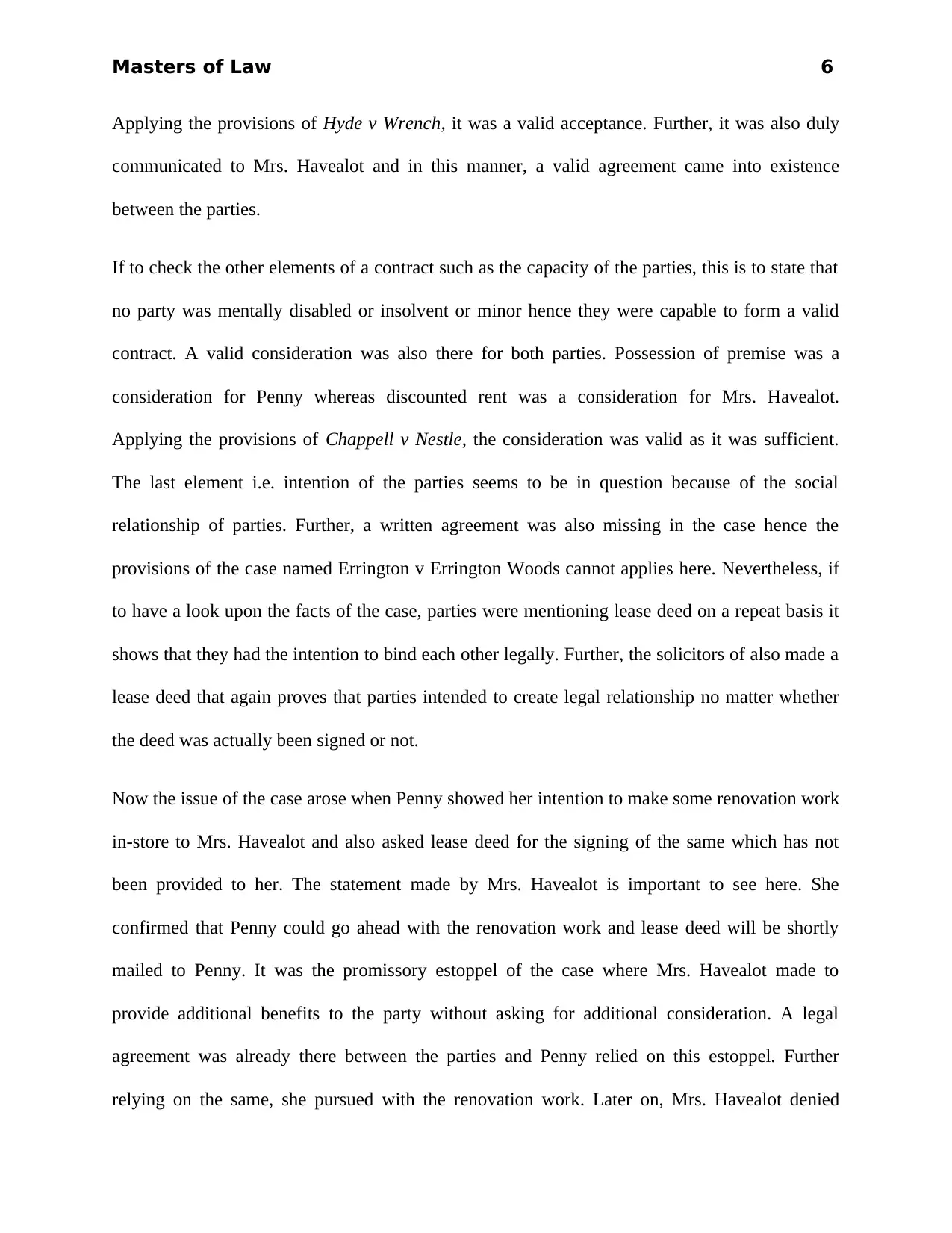
Masters of Law 6
Applying the provisions of Hyde v Wrench, it was a valid acceptance. Further, it was also duly
communicated to Mrs. Havealot and in this manner, a valid agreement came into existence
between the parties.
If to check the other elements of a contract such as the capacity of the parties, this is to state that
no party was mentally disabled or insolvent or minor hence they were capable to form a valid
contract. A valid consideration was also there for both parties. Possession of premise was a
consideration for Penny whereas discounted rent was a consideration for Mrs. Havealot.
Applying the provisions of Chappell v Nestle, the consideration was valid as it was sufficient.
The last element i.e. intention of the parties seems to be in question because of the social
relationship of parties. Further, a written agreement was also missing in the case hence the
provisions of the case named Errington v Errington Woods cannot applies here. Nevertheless, if
to have a look upon the facts of the case, parties were mentioning lease deed on a repeat basis it
shows that they had the intention to bind each other legally. Further, the solicitors of also made a
lease deed that again proves that parties intended to create legal relationship no matter whether
the deed was actually been signed or not.
Now the issue of the case arose when Penny showed her intention to make some renovation work
in-store to Mrs. Havealot and also asked lease deed for the signing of the same which has not
been provided to her. The statement made by Mrs. Havealot is important to see here. She
confirmed that Penny could go ahead with the renovation work and lease deed will be shortly
mailed to Penny. It was the promissory estoppel of the case where Mrs. Havealot made to
provide additional benefits to the party without asking for additional consideration. A legal
agreement was already there between the parties and Penny relied on this estoppel. Further
relying on the same, she pursued with the renovation work. Later on, Mrs. Havealot denied
Applying the provisions of Hyde v Wrench, it was a valid acceptance. Further, it was also duly
communicated to Mrs. Havealot and in this manner, a valid agreement came into existence
between the parties.
If to check the other elements of a contract such as the capacity of the parties, this is to state that
no party was mentally disabled or insolvent or minor hence they were capable to form a valid
contract. A valid consideration was also there for both parties. Possession of premise was a
consideration for Penny whereas discounted rent was a consideration for Mrs. Havealot.
Applying the provisions of Chappell v Nestle, the consideration was valid as it was sufficient.
The last element i.e. intention of the parties seems to be in question because of the social
relationship of parties. Further, a written agreement was also missing in the case hence the
provisions of the case named Errington v Errington Woods cannot applies here. Nevertheless, if
to have a look upon the facts of the case, parties were mentioning lease deed on a repeat basis it
shows that they had the intention to bind each other legally. Further, the solicitors of also made a
lease deed that again proves that parties intended to create legal relationship no matter whether
the deed was actually been signed or not.
Now the issue of the case arose when Penny showed her intention to make some renovation work
in-store to Mrs. Havealot and also asked lease deed for the signing of the same which has not
been provided to her. The statement made by Mrs. Havealot is important to see here. She
confirmed that Penny could go ahead with the renovation work and lease deed will be shortly
mailed to Penny. It was the promissory estoppel of the case where Mrs. Havealot made to
provide additional benefits to the party without asking for additional consideration. A legal
agreement was already there between the parties and Penny relied on this estoppel. Further
relying on the same, she pursued with the renovation work. Later on, Mrs. Havealot denied
Paraphrase This Document
Need a fresh take? Get an instant paraphrase of this document with our AI Paraphraser
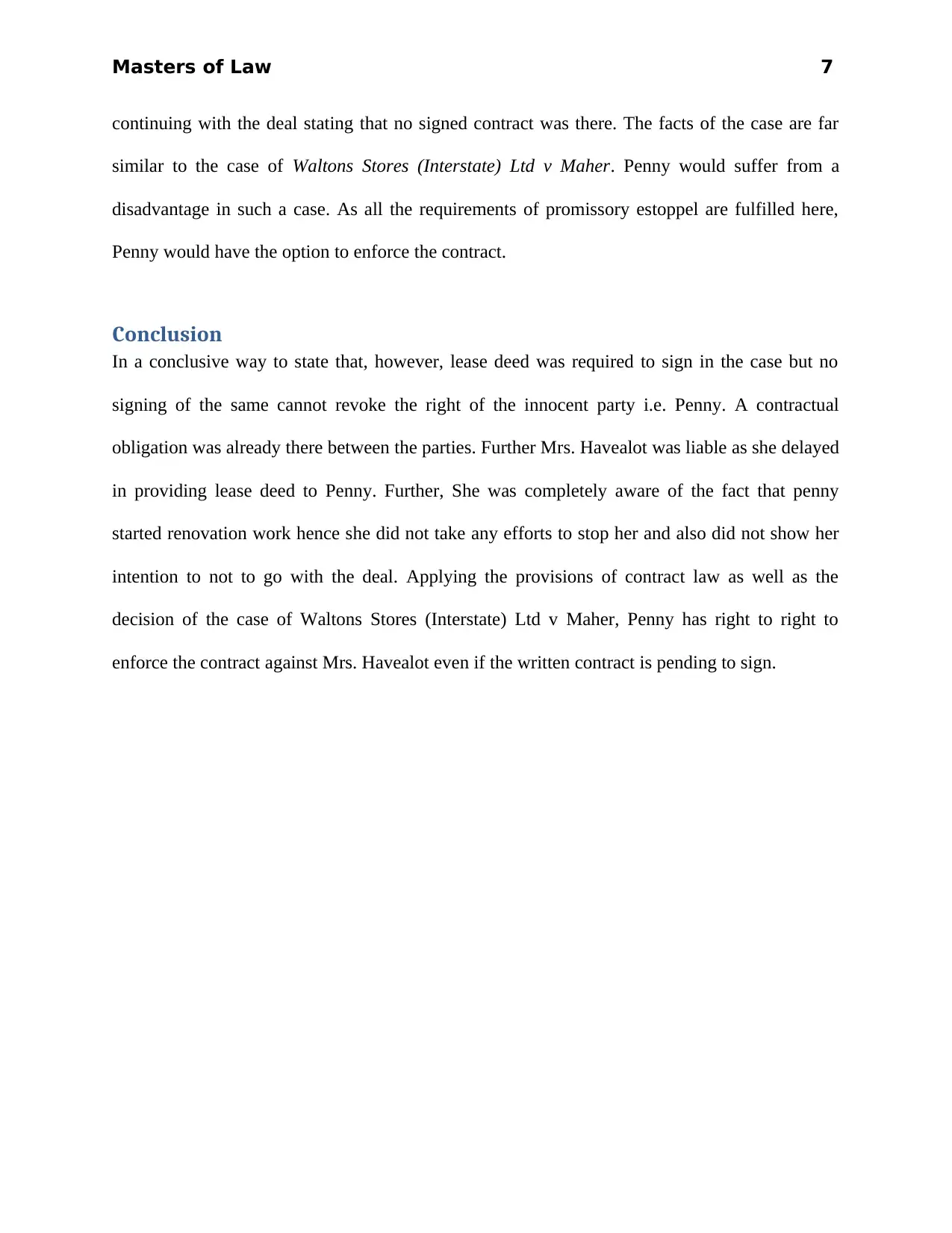
Masters of Law 7
continuing with the deal stating that no signed contract was there. The facts of the case are far
similar to the case of Waltons Stores (Interstate) Ltd v Maher. Penny would suffer from a
disadvantage in such a case. As all the requirements of promissory estoppel are fulfilled here,
Penny would have the option to enforce the contract.
Conclusion
In a conclusive way to state that, however, lease deed was required to sign in the case but no
signing of the same cannot revoke the right of the innocent party i.e. Penny. A contractual
obligation was already there between the parties. Further Mrs. Havealot was liable as she delayed
in providing lease deed to Penny. Further, She was completely aware of the fact that penny
started renovation work hence she did not take any efforts to stop her and also did not show her
intention to not to go with the deal. Applying the provisions of contract law as well as the
decision of the case of Waltons Stores (Interstate) Ltd v Maher, Penny has right to right to
enforce the contract against Mrs. Havealot even if the written contract is pending to sign.
continuing with the deal stating that no signed contract was there. The facts of the case are far
similar to the case of Waltons Stores (Interstate) Ltd v Maher. Penny would suffer from a
disadvantage in such a case. As all the requirements of promissory estoppel are fulfilled here,
Penny would have the option to enforce the contract.
Conclusion
In a conclusive way to state that, however, lease deed was required to sign in the case but no
signing of the same cannot revoke the right of the innocent party i.e. Penny. A contractual
obligation was already there between the parties. Further Mrs. Havealot was liable as she delayed
in providing lease deed to Penny. Further, She was completely aware of the fact that penny
started renovation work hence she did not take any efforts to stop her and also did not show her
intention to not to go with the deal. Applying the provisions of contract law as well as the
decision of the case of Waltons Stores (Interstate) Ltd v Maher, Penny has right to right to
enforce the contract against Mrs. Havealot even if the written contract is pending to sign.
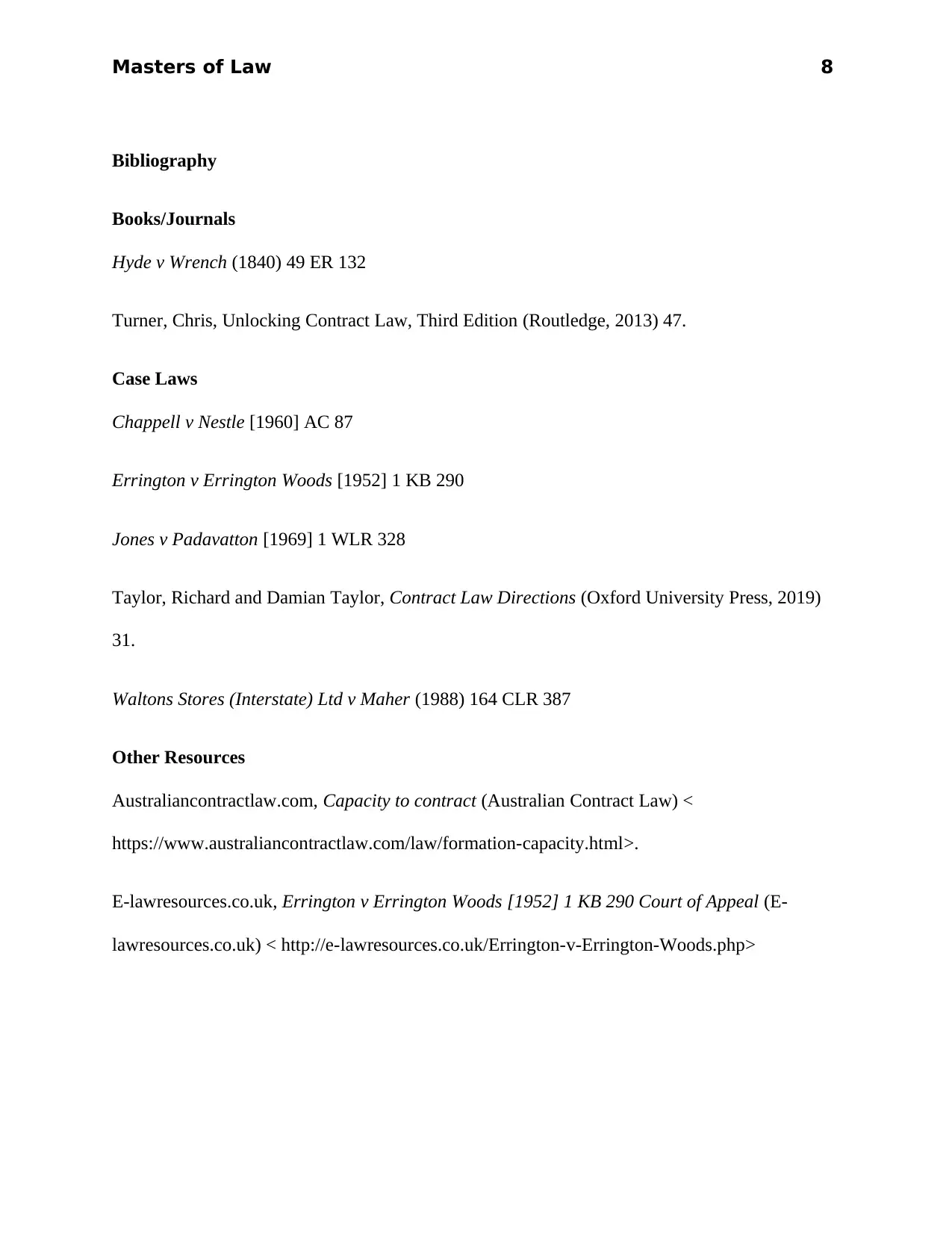
Masters of Law 8
Bibliography
Books/Journals
Hyde v Wrench (1840) 49 ER 132
Turner, Chris, Unlocking Contract Law, Third Edition (Routledge, 2013) 47.
Case Laws
Chappell v Nestle [1960] AC 87
Errington v Errington Woods [1952] 1 KB 290
Jones v Padavatton [1969] 1 WLR 328
Taylor, Richard and Damian Taylor, Contract Law Directions (Oxford University Press, 2019)
31.
Waltons Stores (Interstate) Ltd v Maher (1988) 164 CLR 387
Other Resources
Australiancontractlaw.com, Capacity to contract (Australian Contract Law) <
https://www.australiancontractlaw.com/law/formation-capacity.html>.
E-lawresources.co.uk, Errington v Errington Woods [1952] 1 KB 290 Court of Appeal (E-
lawresources.co.uk) < http://e-lawresources.co.uk/Errington-v-Errington-Woods.php>
Bibliography
Books/Journals
Hyde v Wrench (1840) 49 ER 132
Turner, Chris, Unlocking Contract Law, Third Edition (Routledge, 2013) 47.
Case Laws
Chappell v Nestle [1960] AC 87
Errington v Errington Woods [1952] 1 KB 290
Jones v Padavatton [1969] 1 WLR 328
Taylor, Richard and Damian Taylor, Contract Law Directions (Oxford University Press, 2019)
31.
Waltons Stores (Interstate) Ltd v Maher (1988) 164 CLR 387
Other Resources
Australiancontractlaw.com, Capacity to contract (Australian Contract Law) <
https://www.australiancontractlaw.com/law/formation-capacity.html>.
E-lawresources.co.uk, Errington v Errington Woods [1952] 1 KB 290 Court of Appeal (E-
lawresources.co.uk) < http://e-lawresources.co.uk/Errington-v-Errington-Woods.php>
⊘ This is a preview!⊘
Do you want full access?
Subscribe today to unlock all pages.

Trusted by 1+ million students worldwide

Masters of Law 9
Lawcasesummaries.com, Waltons Stores (Interstate) Ltd v Maher (1988) 164 CLR 387 (Law
case summaries) < https://lawcasesummaries.com/knowledge-base/waltons-stores-interstate-ltd-
v-maher-1988-164-clr-387/>
Lawcasesummaries.com, Waltons Stores (Interstate) Ltd v Maher (1988) 164 CLR 387 (Law
case summaries) < https://lawcasesummaries.com/knowledge-base/waltons-stores-interstate-ltd-
v-maher-1988-164-clr-387/>
1 out of 10
Related Documents
Your All-in-One AI-Powered Toolkit for Academic Success.
+13062052269
info@desklib.com
Available 24*7 on WhatsApp / Email
![[object Object]](/_next/static/media/star-bottom.7253800d.svg)
Unlock your academic potential
Copyright © 2020–2025 A2Z Services. All Rights Reserved. Developed and managed by ZUCOL.



